How do you recognize a jackdaw and a young jackdaw? How can you tell the difference between jackdaw and carrion crow? And what does the jackdaw nest look like? We answer these and other questions in our profile.

The jackdaw (Corvus monedula) is often overshadowed by its well-known relative, the Carrion crow. Often it is not even perceived as an independent bird species. They are particularly intelligent and lively birds that have always been closely associated with humans. Jackdaws are cultural followers and settled in our immediate vicinity very early on. Even today they mainly breed in buildings and make use of orchards, grain fields and other human structures. How you can clearly identify a jackdaw, recognize its reputation and how you can give the crows a home, you can find out here in our large profile.
contents
- Jackdaw: fact sheet
-
This is how you recognize the jackdaw
- What is the difference between jackdaw and carrion crow?
- How does the jackdaw song sound?
- How do you recognize a young jackdaw?
- What do jackdaw eggs look like?
- Which habitat does the jackdaw prefer?
- Where does the jackdaw build its nest?
- When is the jackdaw breeding season?
- Where does the jackdaw spend the winter?
-
Support the jackdaw in the garden: this is how it works
- What do jackdaws eat?
- Which nest boxes are suitable for jackdaws?
- How can you additionally support the jackdaw?
Jackdaw: fact sheet
| size | About 33 - 34 cm |
| weight | About 250 g |
| Breeding season | April June |
| lifespan | Up to 20 years |
| habitat | Open, but structurally rich landscapes, parks and large gardens |
| Feed preference | Omnivores: insects, worms, carrion, grains and berries |
| Threats | Lack of nesting opportunities |
This is how you recognize the jackdaw
Like most crows, jackdaws have black plumage. However, they are smaller than most of their relatives and about the size of a pigeon. They are also easy to recognize by their blue-gray neck and their bright, light blue eyes. Jackdaws males and females cannot be distinguished from each other purely visually.
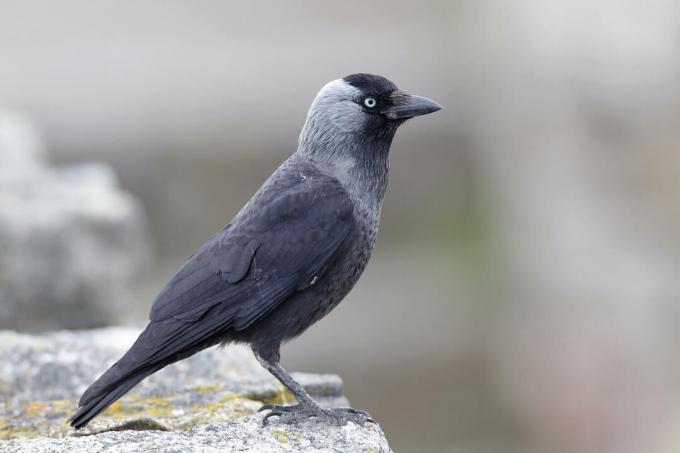
What is the difference between jackdaw and carrion crow?
Jackdaws are significantly smaller than the closely related ones Carrion crows. They also look less elegant, but rather a bit stocky and compact. In addition, they have clear characteristics, such as the blue-gray neck and their light blue eyes, by which you can recognize them. Carrion crows, on the other hand, are solid black.
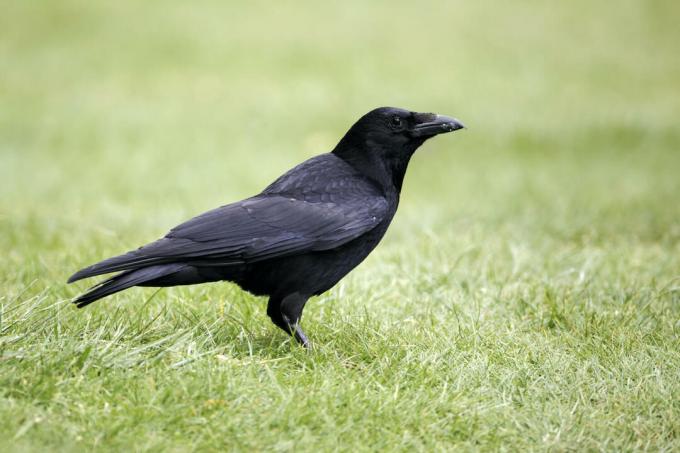
How does the jackdaw song sound?
Jackdaw singing consists of inconspicuous, rough chatter that has little structure. Often other birds are also imitated or different sounds from the environment are picked up. The calls of the jackdaw, which can often be heard in groups or in flight, such as "Kya-kya-kya", are somewhat more easily identifiable. The warning calls sound like a hotter, stretched "Tscharrrr".
The jackdaw's call sounds like this:
How do you recognize a young jackdaw?
Very young jackdaws that have just fledged are still quite inconspicuous. They are solid black and look quite similar to other crow chicks. The blue-gray neck plumage, however, develops very quickly and the young animals already resemble the adults after a few weeks - although the neck is even less intensely colored. You can also always recognize young jackdaws by their bright, light blue eyes.
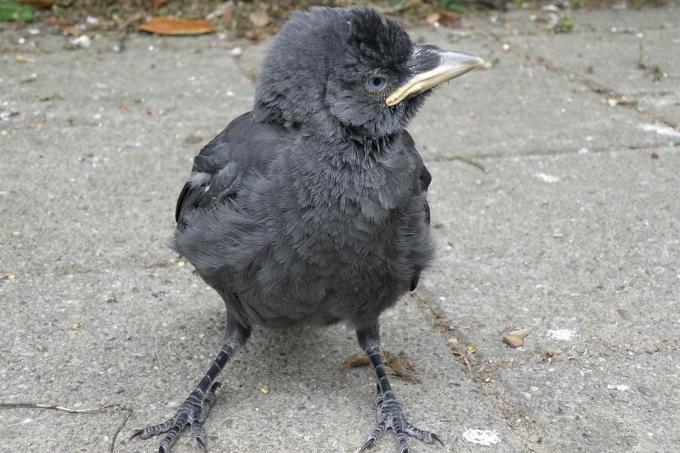
What do jackdaw eggs look like?
Jackdaws lay about 3 centimeters large, light blue eggs that are coated with dark spots. Usually between four and six eggs are laid in a nest. The nest itself is in a cave and is made from small sticks, bits of bark, other plant fibers, hair and soil.
Which habitat does the jackdaw prefer?
When looking for a suitable habitat, jackdaws look out for two things: wide, open spaces where they can forage for food and cave-like structures in which to build their nests can. They therefore like to inhabit arable and meadow landscapes near settlements, but also quarries or cities with sufficiently large green spaces.
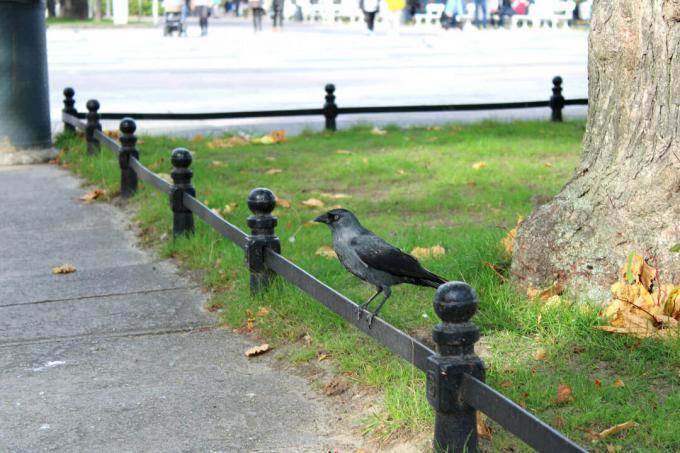
Where does the jackdaw build its nest?
Jackdaws are pronounced cave brooders. Naturally, they would breed in crevices and niches in the rock, but nowadays they mainly use old buildings and adopt facade holes and chimneys there. But natural tree hollows such as knotholes or old woodpecker holes and nesting boxes are also popular. Both sexes take care of the nest building and sometimes even unmated young birds from the previous year help.
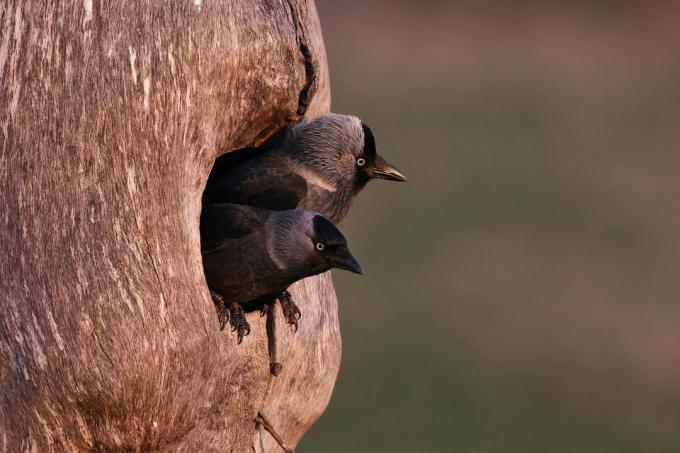
When is the jackdaw breeding season?
The breeding season for jackdaws begins in April. After laying eggs, it is the female's job to incubate the eggs for up to 20 days. During this time it is supplied with food by the male. The newly hatched young birds are fed in the nest for four to five weeks and, after leaving the nest, are supported by their parents for as long as they need to find food. The breeding season of the jackdaws ends in June and no second brood follows. Jackdaws also have monogamous brood marriages, and most couples stay together for life.
Where does the jackdaw spend the winter?
Most of our domestic jackdaws spend the whole year in Germany. Only a few populations leave their breeding grounds and move shorter distances to the south or southwest. In fact, we tend to have an excess of jackdaws in winter, as animals from Northern Europe often escape the frosty temperatures of their homeland and hibernate with us.

Support the jackdaw in the garden: this is how it works
Due to the renovation of old buildings, there are fewer and fewer nesting opportunities for jackdaws. In some parts of Germany, the stocks are therefore already endangered. Find out here how you can give the birds a home and support them in other ways.
What do jackdaws eat?
Jackdaws are real omnivores. They feed on insects, spiders, worms and other small animals, and use carrion, fruit and berries. In winter you can often share them with other relatives of the crow, such as carrion crows or Rookslooking for food in fields.
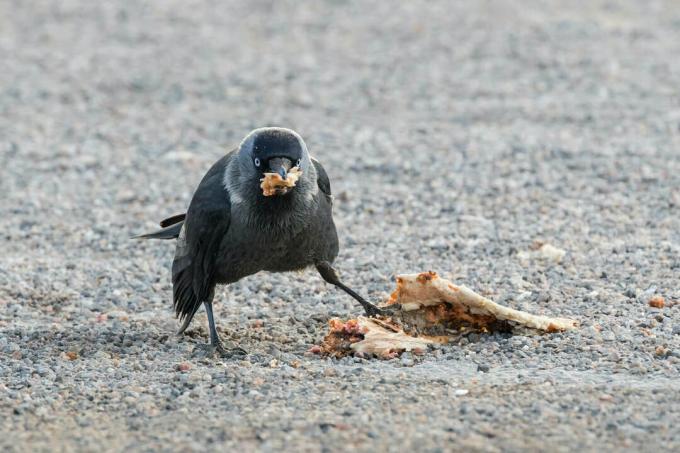
Jackdaws are also happy to visit bird feeders - whether in winter or during the breeding season. They are also not particularly fussy about food and accept any form of litter or grain forage that is offered. Our Plantura year-round bird food For example, it contains a lot of rich seeds that the crows can do kindly to - in winter it donates valuable ones Energy for heat production and in summer it brings an extra load of proteins and an addition of feed lime for pregnant women Bird parents.
Which nest boxes are suitable for jackdaws?
If you want to offer jackdaws a nesting place, you can build a jackdaw nest box yourself with little effort. This should be a full cave nest box that is closed all around except for a small entrance hole. The entrance hole should be 15 cm and the base of the nesting box should be around 28 x 17 cm. The nesting aids should be installed at a height of several meters in a location safe from cats and other predators.
Tips on how to do a Build your own nest box can be found in our special article.

How can you additionally support the jackdaw?
In addition to the bird food offered, jackdaws also enjoy a rich natural food supply in home gardens. You too can by designing one insect-friendly garden create a little jackdaw paradise. Avoid using chemical pesticides, as these often contain toxic substances and thus not only counteract your insect-promoting measures, but also poison birds through the food chain can.
You can also score points with garden birds by adding a water point. Whether pond, stream or water bowl - the feathered visitors will thank you on hot days. However, make sure you clean your water points regularly. Bird baths or baths can quickly develop into a breeding ground for infectious diseases, especially on hot days, and should therefore be cleaned daily in summer.
Not only jackdaws are happy about a little refreshment in between, of course, but also numerous other garden birds, such as the one Tail tit or the Dunnock.
